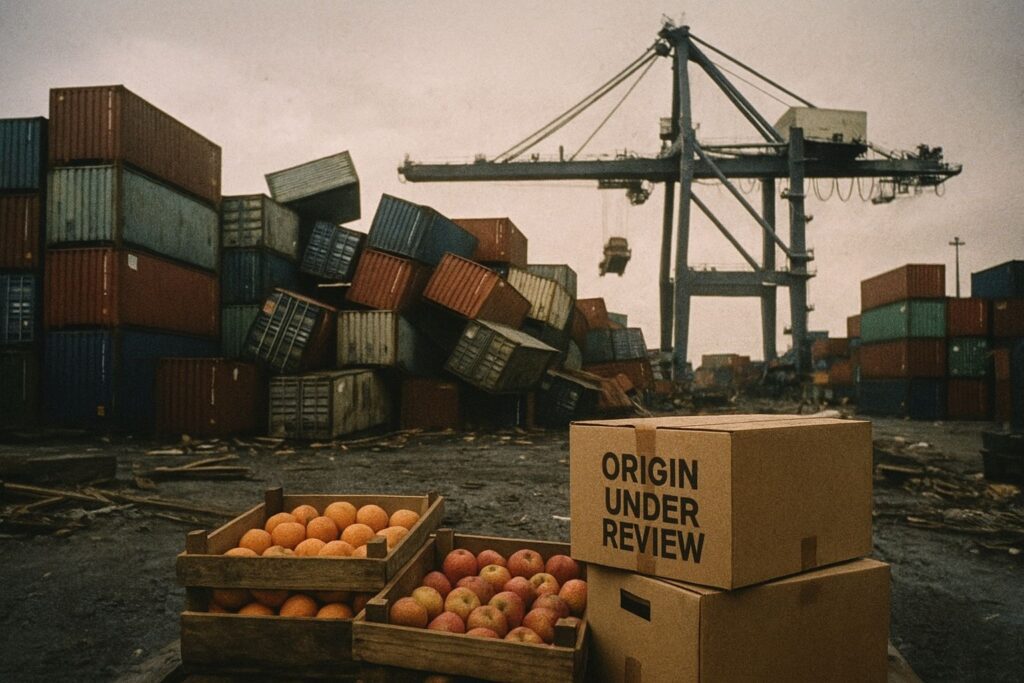MSU researchers unveil how 2025’s tariff upheaval disrupted trade and pricing systems worldwide, with consequences for Michigan and beyond.
2025 Tariff Shock Hikes Created Unprecedented Trade Disruption
EAST LANSING, Mich. – A sweeping study by Michigan State University warns that the United States’ 2025 tariff hikes — the largest since the 1930s — created a turbulent economic shock that continues to ripple across global supply chains. Researchers at MSU’s Broad College of Business say the rapidly enacted and reversed trade policies in 2025 exposed severe weaknesses in how firms adapt to such volatility.
The paper, titled “Shock and Awe: A Theoretical Framework and Data Sources for Studying the Impact of 2025 U.S. Tariff Increases”, was published in the Journal of Supply Chain Management and authored by Jason Miller, the Eli Broad Endowed Professor in Supply Chain Management at MSU.
“Unlike previous trade wars, the 2025 actions came with extreme uncertainty,” Miller said. “We wanted to provide a framework to help researchers and practitioners make sense of what’s happening and what to expect going forward.”
Supply Chain Theory Updated With Real-World Instability

The study introduces a framework based on three cost categories firms face in response to trade shocks: adjustment costs, transaction costs, and opportunity costs of acting too early or too late. These concepts help explain how companies hesitate or pivot in sourcing, production shifts, and pricing decisions.
Notably, 2025’s tariff actions were imposed, revoked, and then reinstated in quick succession. This forced major U.S. importers to maintain five to ten different sourcing plans at once due to policy unpredictability, Miller noted.
The research builds upon existing trade theory by explicitly incorporating the impact of uncertainty and misconduct — including falsified country-of-origin records — into firm behavior. This real-world insight creates a more comprehensive model of how global companies respond to economic shocks.
Retail Prices, Farmers, and Consumers Feel the Pinch
David Ortega, co-author and Chair in Food Economics and Policy at MSU, pointed to the social costs behind the economic data. “When tariffs are imposed or threatened, that leads to price increases, sourcing challenges and more strain on lower-income households,” Ortega said.
The researchers found that consumer products with no viable domestic substitutes — such as bananas and coffee — were especially vulnerable. Food prices rose as supply chains tightened, forcing budget-conscious families to bear the cost.
“These ripple effects matter and affect everyone,” Ortega emphasized, noting the added pressure on U.S. farmers caught in retaliatory tariff crossfire, as foreign markets pulled back from American exports.
MSU Team Offers Tools to Analyze the 2025 Tariff Shock
The study goes further than diagnosis. It offers a detailed roadmap for policymakers and academics, including access to firm-level trade records, tariff schedules, import/export indexes, and other sector-specific datasets.
Yao “Henry” Jin, a co-author from Miami University, emphasized the study’s forward-looking mission. “The framework offered by our research can help the industrial sector navigate our new and uncomfortable reality as a stable global supply chain built on a belief in free trade gives way to rising geopolitical uncertainty and protectionism.”
This toolkit allows future studies to evaluate:
- The extent to which firms shift production or suppliers,
- How tariffs translate into consumer prices,
- Strategic inventory behavior before tariffs hit,
- Potential misconduct such as false country-of-origin labeling.
Implications for Michigan and U.S. Policy
For Michigan — home to an auto sector reliant on globally sourced components — the framework’s relevance is clear. Fluctuations in steel, electronics, and agriculture inputs deeply affect the state’s manufacturing and farm exports. The study’s authors say ignoring these signals risks worsening inflation and prolonging recovery from global trade instability.
“Whether you’re a policymaker, an importer, retailer or a consumer — you’re affected when supply chains are thrown into turmoil,” Miller said. “This research helps us understand how and why.”
Read More Interesting Feature Stories From ThumbWind
- Michigan Feature News Stories – Unveiling the diverse and vibrant people, captivating places, and remarkable events that come together to make the Great Lake State unique.
- Strange Political News – A sarcastic take on official news from around the U.S., exploring the absurdities that often arise in the political landscape while providing a humorous perspective on current events and highlighting the quirks of politicians and policies.
- Michigan Hometown News – News and events from Michigan’s Upper Thumb region worth knowing, including local stories, impactful interviews, and updates on community happenings that shape the culture and lifestyle of the area.
Your Turn – Like This, or Hate it – We Want To Hear From You
Please offer an insightful and thoughtful comment. We review each response. Follow us to have other feature stories fill up your email box, or check us out at ThumbWind News.




